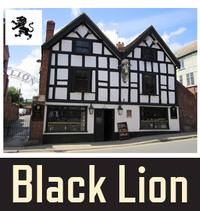


Local Sponsors
-
The Black Lion
31 Bridge Street, Hereford. HR4 9DG
Traditional free house pub, serving local and guest ales. Good public bar plus designated dining area and beer garden. Owner run with an experienced kitchen team.
-
St Martins Dental Practice
75 St Martins Street, Hereford HR2 7RG
The practice was established by Bob Binnersley in 1989. It has gradually expanded ever since and now boasts three dentists, two dental therapists, oral health practitioners, dental radiographers, a practice manager, a receptionist and dental nurses.
More information
Many thanks to The Black Lion for facilitating this camera's location and capitally funding its installation.The Wye Bridge, an esteemed Grade I listed stone bridge in Hereford, gracefully spans the River Wye. The webcam is looking at it. Its construction took place in 1490, replacing an earlier timber bridge that dated back to the twelfth century. During the tumultuous Siege of Hereford in 1645, amidst the English Civil War, the bridge witnessed fierce combat between the defending English Royalists and the besieging Scottish Covenanters. The gatehouse that once stood on the bridge site suffered severe damage during the siege and was subsequently demolished in the eighteenth century.The Wye River originates in the Welsh mountains at Plynlimon, meandering through various towns and villages including Rhayader, Builth Wells, Hay-on-Wye, Hereford, Ross-on-Wye, Symonds Yat, Monmouth, and Tintern, before meeting the Severn estuary just below Chepstow. The etymology of the river's name remains uncertain. The earliest reference to the name can possibly be found in Nennius' early 9th Century Historia Brittonum, where it is referred to as "Guoy," while its modern Welsh name is "Gwy." The Wye later received the Latin name "Vaga," an adjective meaning "wandering." Notably, the Tithe map mentions a Vagas Field in both Whitchurch and Chepstow. Philologists such as Edward Lye and Joseph Bosworth in the 18th and early 19th centuries suggested a possible Old English derivation from "wæg," meaning "wave."The Wye River itself holds the designation of a Site of Special Scientific Interest and is regarded as one of the UK's most significant rivers for nature conservation. The lower valley boasts the status of an Area of Outstanding Natural Beauty. However, in recent times, the Wye's salmon population has experienced a significant decline. According to the Environment Agency's rod catch returns for 2009, the Wye no longer ranks as Wales' most productive salmon river, as the Welsh Dee recorded a higher number of salmon catches. In England, the Tyne, Ribble, Wear, Lune, and Eden rivers all reported larger salmon catches in 2009.


